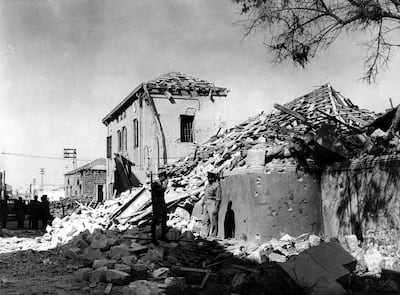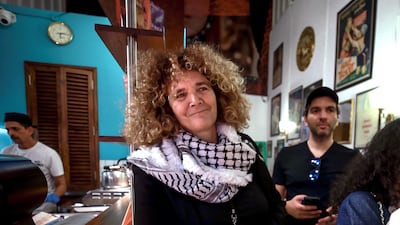Palestinian filmmaker Carol Mansour has an unmistakable presence. It's clear from the moment she steps into Dubai's Cinema Akil. Draped in an emblematic Palestinian keffiyeh and adorned with her signature cascade of curls, she radiates a warmth that is as clear in person as it is in her films. She asks if I'm a hugger, to which I joyfully respond: “yes!”
Aida Returns is the latest of her docufilms, continuing her legacy of powerfully portraying the plight of the displaced people; Stitching Palestine (2017), I Come from a Beautiful Place (2010) and Invisible Children (2006).
Her latest endeavour ventures into uncharted personal territory – a journey suffused with grief, exile and an unwavering commitment to fulfil her mother's final wish.
“It is personal, but it’s also very collective and universal,” Mansour says.
To her, there is no doubt that the film speaks to a larger audience of displaced Palestinians, waiting for their right to return.
“If it were only about me, I wouldn’t have done the film,” Mansour adds.
Fulfilling her mother's lifelong dreams to return
In the twilight of her life, Aida Abboud, Mansour's mother, voiced her last desire: to return to her ancestral home of Jaffa, Palestine.

For Abboud, whose childhood was marred by displacement, the ache for her homeland remained palpable. Fleeing Palestine amid the tumult of 1948, her family sought refuge in Lebanon before eventually resettling in Montreal during the throes of the 1990 Lebanese Civil War. Abboud's dream of returning to her roots remained unfulfilled – a yearning that would ultimately find a bittersweet resolution, thanks to her daughter Carol.
The film, which was never intended for public viewing, takes the audience back through Abboud's fleeting memories of 1948. That was the year of the Nakba, when about 750,000 Palestinians were displaced from their homes, Abboud and her family included.
After falling ill in 2013, Abboud recalled her earliest days in Jaffa from her hospital bed while Mansour filmed. Facing Alzheimer’s disease, she often still told her daughter about her desire to one day return to Jaffa. Following her death in 2015, her family arranged to have her body cremated, a ritual uncommon in the region.
“When I think about it, I wonder why my parents wanted to be cremated because it is bizarre and uncommon. But I would say it’s probably because they did not have a home they wanted to be buried in,” Mansour says.

About a year after Mansour smuggled her mother’s ashes from Montreal to Beirut, she met up with an old friend, photographer Tanya Habjouqa, as well as photojournalist Peter Van Agtmael. Which was when the idea of returning Abboud's remains to Jaffa first came about. The film shows Mansour distributing her mother’s ashes into two zip-lock bags, separating them in case either of them was caught by Israeli security at the checkpoints.
The making of Aida Returns
The idea of creating a documentary recounting Abboud's journey back home did not surface until Habjouqa sent footage of herself with the ashes crossing the border between Amman and the West Bank, telling Abboud, “welcome to Palestine.”
Mansour admits, “That’s when I told myself, this is a film. I mean, this is literally when Aida [fulfilled her name],” referencing how her mother’s name translates to “return” in Arabic, which she sees as more than coincidental.

With the miraculous help of local strangers, close family friends Tanya, Raeda and Muna eventually found Abboud's childhood home in Jaffa. It had the same narrow staircase that Abboud had described from her memories, the same beautiful garden and the floors she walked on every day. Only now, it was occupied by Israelis.
Undeterred, the team of women eventually laid Abboud's remains to rest in her homeland; with her ashes spread across her childhood home’s garden, a cemetery where her family had been laid to rest and the Mediterranean Sea.
The journey to fulfil Abboud's wish was fraught with challenges and emotions. Mansour recounts the hurdles she faced in smuggling her mother's ashes from Montreal to Beirut and the subsequent journey to Jaffa: “There was no sense of jealousy that I was not able to take my mother myself to Palestine. I was very grateful that my friends were doing this. I was frustrated at the system. I felt happiness that she will eventually return to her home, but sadness that she could not return while she was alive.”
As Mansour aided her team via FaceTime in navigating the streets of Jaffa in search of her mother’s home, the echoes of Abboud's memories came to life. “These steps she used to walk up and down every day, that door, that window. She’d describe how they would play cards and have dinner with their friends. Imagining that all this happened here, I had a mixture of feelings. I wanted to cry but I didn't want to because I was being filmed. So I didn't want to show so many emotions,” Mansour says.
The film, which is almost entirely shot by phone, feels organic and raw, which only adds to the depth of the sorrowful storyline.
“I filmed everything on my phone, it was very personal. It was intended for me, for my brothers, for my father, for the family,” says Mansour, underscoring the deeply intimate nature of the footage. Because it is all unscripted, Mansour's genuine facial expressions offer poignant insight into her emotional journey as her friends come closer to uncovering her mother's long-lost home.
Throughout the film, Abboud's vibrant personality radiates, in her painted nails as she rests in her hospital bed and in her unwavering sense of humour despite the encroaching grasp of Alzheimer's.
Even with the struggles she faced, it’s clear Abboud was a woman who loved life as much as she loved her hometown, echoing a love shared by many Palestinians. Although Abboud remained unaware of the documentary's production, there is little doubt for Mansour that her mother would have found immense pride in her daughter's cinematic tribute.

“If my mother saw the film, I'm pretty sure she would be very proud of her daughter and all the people who are watching. And she would be laughing from up above, screaming 'I've returned!'” says Mansour.
Undoubtedly, Mansour inherits her mother’s sharp wit and humour. When asked about whether crafting the film aided in coping with the loss of her mother, she says: “Definitely, but I hope I won't have to create a film every time I lose a loved one!”
Moving forward with change
It is true that people find different outlets to mourn, and Mansour's solace lies in the art of filmmaking. This was notably evident when she crafted a poignant five-minute tribute to her father following his demise from Covid-19 in 2020. “I wanted to find a way to mourn, especially given the absence of funerals during the pandemic,” she reflects.
However, personal catharsis is not the sole objective of Mansour’s cinematic endeavours. Delving into the intricacies of Aida Returns, she says, “the film is incredibly layered, touching upon themes of Alzheimer's, the mother-daughter relationship, the right of return and themes of identity and belonging.”
A sense of purpose imbues her work. “In all my films I work on human rights because art is a tool. It’s not that I have a mission, but if I don’t have a purpose I feel empty.” From Stitching Palestine to We Cannot Go There Now, My Dear and Aida Returns, Mansour’s work provides evidence of her commitment to humanitarian causes.
With a screening of Aida Returns in 130 countries set for her mother’s birthday on Monday, Mansour is now preparing to launch an impact campaign. Through the website dedicated to the film, Mansour is trying to help people return home virtually, just as she witnessed the return of her mother through her phone screen.

“Tarek Bakri, a man who already does this work, is helping me on these tours where we're trying to collect stories from the people who were there [pre-1948] and still remember the locations of their homes,” she says.
Mansour's next film is about Gaza
Acknowledging that she once envisioned the film as the pinnacle of her career, Mansour has also unveiled her latest project to The National. “I am now working on a documentary film on Dr Ghassan Abu Sittah,” she says.
Abu Sittah, a British-Palestinian reconstructive surgeon who flew to Gaza to assist in the treatment of the wounded soon after October 7 and fled for his safety on November 19, has emerged as a hero to those who support the humanitarian cause.
“He told a close friend of mine, Mona Khaldi, that he was flying to Amman within three hours for a day, and we bought tickets that same second to meet him in Amman,” she says.
Filming for the documentary almost complete, Mansour is determined to release the film as soon as possible, with all proceeds donated to The Ghassan Abu Sittah Children’s Fund, which she played a pivotal role in establishing.
In tracing the deeply personal odyssey of Aida Returns, Carol Mansour has not only crafted a touching homage to her mother but has also illuminated the broader struggle of the Palestinian people for justice and belonging. Through her storytelling and the emotional depth of her vision, Mansour invites audiences to navigate the labyrinthine landscapes of grief, exile and the eternal quest for home.
As Mansour embarks on her next endeavour, documenting the heroism of Abu Sittah, she continues to channel her creative prowess into amplifying the voices of the marginalised and dispossessed.
With each frame she captures and each narrative she unfurls, Mansour reaffirms her unwavering commitment to humanitarian causes, leaving a lasting mark on both cinema and the collective consciousness. As Aida Returns embarks on its global journey, resonating with audiences far and wide, Mansour stands as a symbol of resilience, compassion and the enduring power of storytelling and cinema to bridge divides and inspire change.
Aida Returns is now playing at Cinema Akil

